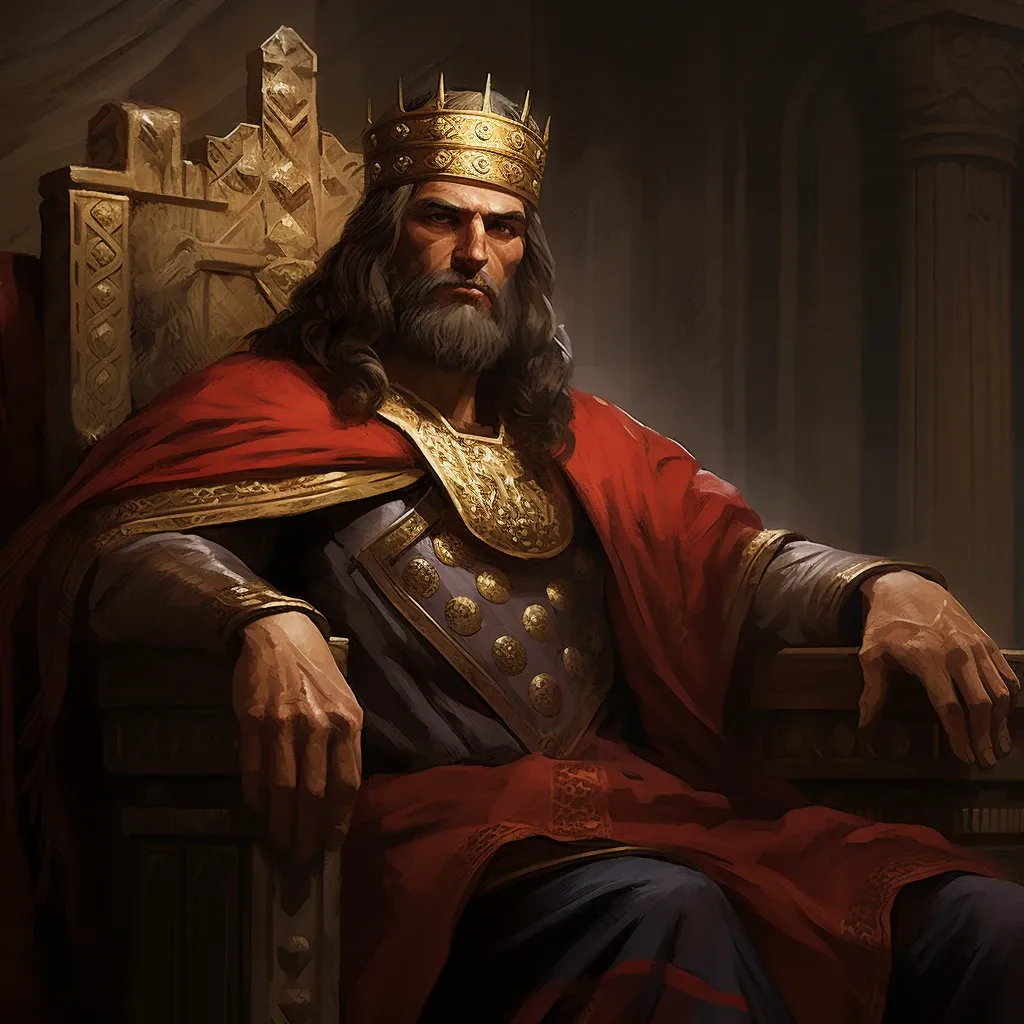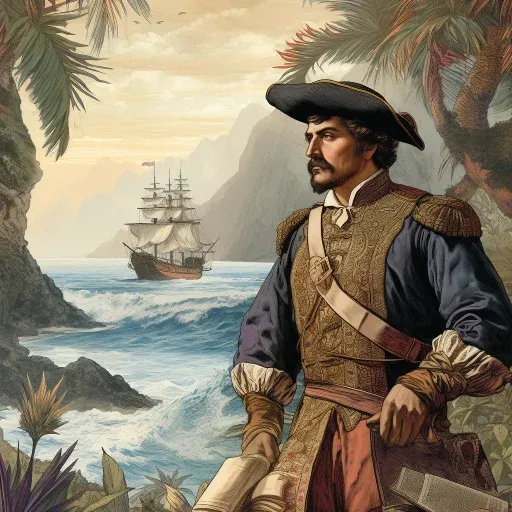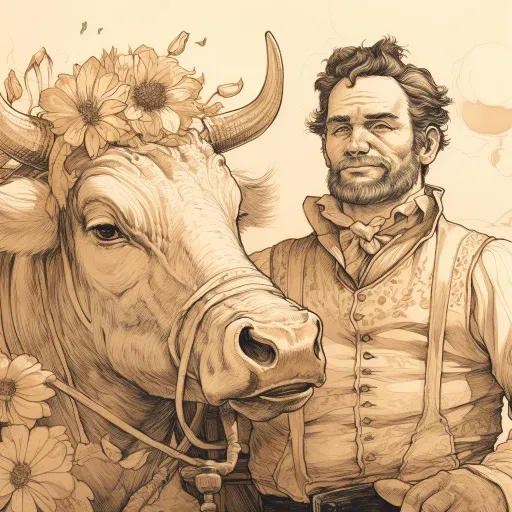BY JAMES BALDWIN
As Rich as Croesus
Famous Stories Retold: Story 14 of 30

Heading

Kingdom’s Wealth: Croesus’ kingdom was one of the wealthiest in the ancient world, largely due to the gold found in the Pactolus River.
Historical Legacy: The story of Croesus serves as a cautionary tale about the impermanence of wealth and the dangers of hubris.
A good book we like, we explorers. That is our best amusement, and our best time killer
- Roald Amundsen, Explorer
The Wealth of Croesus: Solon's Wisdom Unfolded
In history, few tales enthrall as much as the intriguing discourse between King Croesus, once deemed the wealthiest man on earth, and Solon, the paragon of wisdom. This tale, teeming with age-old wisdom and philosophical insights, provokes a profound redefinition of true wealth and happiness. Through this narrative, we explore the shifting sands of fortune, the ephemeral nature of worldly riches and the unalloyed wisdom that transcends temporal bounds. Are you ready to delve into this captivating saga and reap its timeless lessons?
The Prosperous Reign of King Croesus
King Croesus, the ruler of Asia, was known for his immense wealth and prosperous reign. His kingdom, albeit not too large, flourished under his rule and the people thrived in their affluence. The king himself was reputed as the richest man in the world, a phrase that has survived through the centuries, leading to the popular saying, "as rich as Croesus." The king reveled in his wealth, owning vast lands, magnificent houses, and numerous slaves. He was adorned in the finest clothing and surrounded by beauty that left him content and self-proclaimed as the happiest man in the world.
Solon's Visit to King Croesus' Palace
On a warm summer day, Solon, the renowned lawmaker of Athens, traveled to Asia and visited King Croesus. Famous for his wisdom, Solon was held in high esteem, being compared to the wise even centuries after his demise. Eager to impress the wise man, Croesus proudly showed Solon his opulent palace, displaying grand rooms, exquisite carpets, plush couches, rich furniture, priceless artworks, and an extensive library of books. He also showcased his splendid gardens, orchards, stables, and thousands of unique collectibles from around the world, hoping to earn his affirmation.
Dive Deeper 'Timeless Wisdom' Podcast
Video with Captions and Visualizer
Solon's Insight on True Happiness
During a meal, Croesus asked Solon to name the happiest man, hoping he would be the one. But the wise Solon mentioned the name of Tellus, a poor Athenian man who lived an honest life, worked hard to educate his kids, and died serving his country. Taken aback by this unexpected response, Croesus hid his disappointment and asked Solon to name the second happiest man. Once again, Solon mentioned two brothers who labored tirelessly to support their ailing mother and served their city after her demise. This reflection on true happiness irked Croesus, who felt insulted that his wealth and power were deemed insignificant in the pursuit of genuine happiness.
The Downfall of King Croesus under Cyrus' Reign
As time passed, the world's stage saw the emergence of a new mighty ruler, Cyrus, who embarked on a mission to expand his reign over Asia. With a vast army at his disposal, he swiftly overpowered kingdoms, adding them to his colossal empire of Babylon. Despite his vast wealth and resources, King Croesus found himself incapable of resisting this inexorable force.
Cyrus' forces eventually breached the city of Croesus, laying waste to his once magnificent palace, orchards, and gardens. The wealthy king was captured, his treasured possessions seized and carried off, marking the end of his prosperous reign. The man once known as the wealthiest in the world was now but a powerless prisoner, underscoring the transient nature of material wealth.

Croesus’ Moment of Reflection: The Wisdom of Solon Resurfaces
In a cruel twist of fate, the once mighty Croesus was led to the marketplace by Cyrus' soldiers, and bound in the center of a pyre constructed from the remnants of his once resplendent palace. As he lay there beaten and bloody, the inevitability of his death looming, the words of Solon echoed in his mind.
Faced with the harsh reality of his situation, Croesus understood the truth in Solon's wisdom. True happiness indeed lay beyond material wealth and power. The wisdom of the Athenian lawmaker resonated with a newfound clarity as he lamented, "O Solon! O Solon! Solon!" His cries filled the air, a haunting reminder of his fall from grace and the impermanence of worldly riches.
Cyrus' Change of Heart: Freedom for Croesus
Cyrus, happening to pass by, heard the mournful cries of Croesus. Intrigued, he inquired about the repeated utterance of Solon's name. After some persuasion, Croesus recounted the story of Solon's visit and the wisdom he had shared. Cyrus was deeply moved by this tale and found himself reflecting upon the fleeting nature of power and wealth.
This revelation led Cyrus to reconsider his actions. The once ruthless conqueror adopted a new perspective, acknowledging the importance of compassion and mercy. He ordered the release of Croesus, treating him henceforth with the respect reserved for honored friends. Thus, the wisdom of Solon not only saved Croesus but also inspired a significant change in the mighty Cyrus, demonstrating the enduring power of wisdom in shaping lives and destinies.
Conclusion
The tale of King Croesus and Solon's dialogue unfolds timeless wisdom, reminding us that true wealth is not measured by material possessions, but by one's virtue and integrity. The story unravels a profound lesson - the fleeting nature of worldly riches and the importance of moral fortitude. As we navigate through our lives, may we remember Solon's wisdom and strive for a wealth that transcends the material, a wealth that is eternal and truly enriching. The saga of King Croesus and Solon is not just a historical narrative, but a beacon guiding us towards a deeper understanding of true wealth and happiness.





